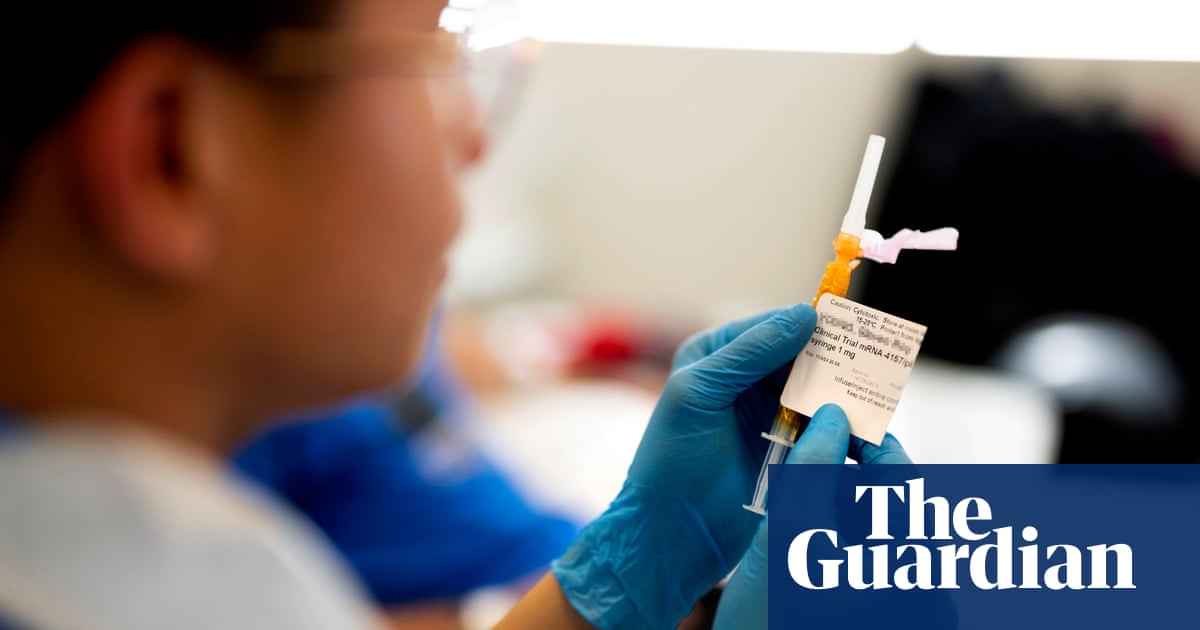The world’s first personalized mRNA cancer vaccine to treat skin cancer halves the risk of patients dying or having the disease recur, according to trial results that doctors described as “very impressive”.
Skin cancer affects more than 150,000 people annually worldwide, according to 2020 figures issued by the World Cancer Research Fund.
Data presented at the world’s largest cancer conference showed that patients who received the vaccine after stage III or IV skin cancer had been removed had a 49% lower risk of death or recurrence of the disease after three years. The NHS is among the organizations testing the vaccine.
Patients in the Phase 2b trial had high-risk melanomas and either had the vaccine developed by Moderna and Merck along with the Keytruda immunotherapy or were given Keytruda alone.
The 2-1/2-year recurrence-free survival rate after receiving the shot with Keytruda was 74.8%, compared with 55.6% for Keytruda alone, delegates heard at the American Society of Clinical Oncology (ASCO) annual meeting in Chicago.
“We are encouraged by the latest results,” said Kyle Hollin, president of Moderna’s development, therapeutics and oncology division. “These results reinforce our commitment to developing this innovative treatment.”
Ian Foulkes, executive director of research and innovation at Cancer Research UK, said the findings represent another milestone in the “exciting and evolving landscape of cancer vaccine research”.
He said: “After three years of follow-up, the data suggest that levels of cancer recurrence have not increased in people with high-risk advanced stage skin cancer.” “The results highlight the great promise of therapeutic cancer vaccines used in combination with powerful immunotherapies.”
The vaccine, known as mRNA-4157 (V940), is tailored to each patient and tells their body to kill any remaining cancer cells and prevent the disease from coming back.
A sample of the tumor is removed during the patient’s surgery, followed by DNA sequencing and the use of artificial intelligence. The result is an anti-cancer injection tailored specifically to the patient’s tumor.
A second trial presented at ASCO, led by the University of Vienna, found that cancer vaccines can significantly improve the survival of breast cancer patients after surgery.
The study included 400 patients with early-stage breast cancer. Half of them were given a vaccine to stimulate their immune systems before surgery.
After seven years, 81% of patients who received the vaccine were still alive and free of breast cancer, compared to 65% of those who received usual care.
Lead author, Dr Christian Singer, said: “This is the first significant and profound long-term survival benefit of an anti-cancer vaccine in breast cancer patients reported to date.”
Professor Charles Swanton, chief clinician at Cancer Research UK, said the results of the melanoma trial were “very impressive”.
“It’s very exciting,” Swanton said. “This new vaccine approach is another piece of the puzzle that will allow more patients to be cured, we hope, or for fewer patients to suffer disease relapse. Ultimately it will contribute to continually improving survival rates over the decades.” Coming and more.
Thousands of patients in England are being fast-tracked into pioneering trials of personalized cancer vaccines under a revolutionary world-first NHS ‘matchmaking’ scheme to save lives.

“Amateur organizer. Wannabe beer evangelist. General web fan. Certified internet ninja. Avid reader.”




/cdn.vox-cdn.com/uploads/chorus_asset/file/25550621/voultar_snes2.jpg)


More Stories
Bitcoin Fees Near Yearly Low as Bitcoin Price Hits $70K
Court ruling worries developers eyeing older Florida condos: NPR
Why Ethereum and BNB Are Ready to Recover as Bullish Rallies Surge